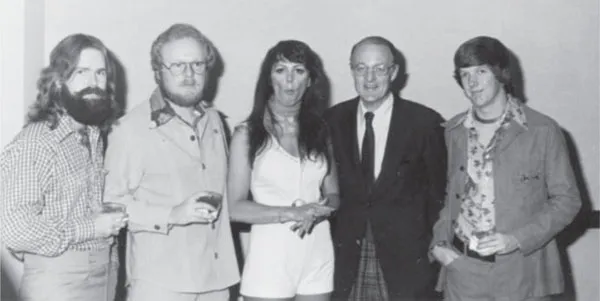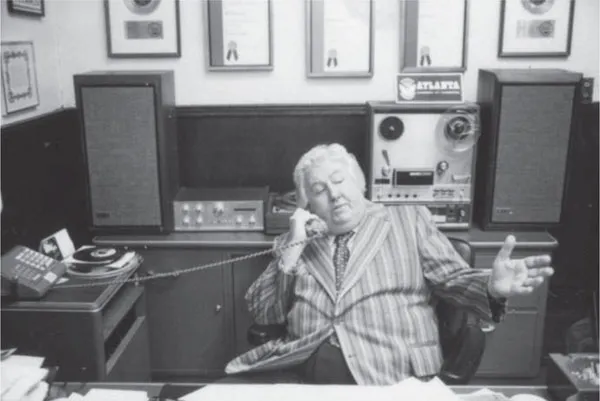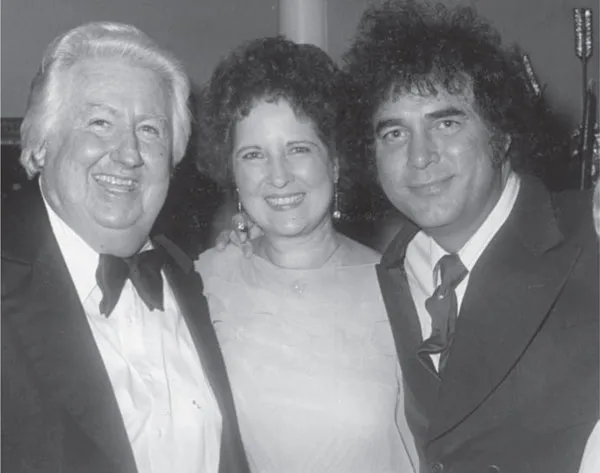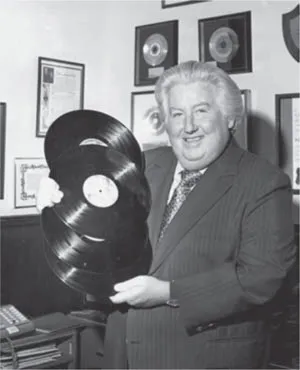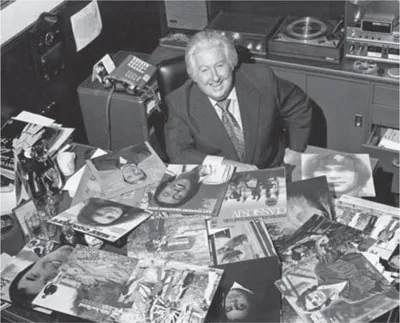![]()
1
BUTCH LOWERY
Remembering his famous dad and all his musical friends
When he was twenty-seven years old, in 1951, and a fairly recent transplant to Atlanta, Bill Lowery, a DJ with a knack for gathering young musical talent around him, hit his leg on his bed. The sore wouldn’t heal and kept growing. When he finally went to the doctor, he found out, to his horror, that it was cancer. He had no life insurance and began wondering how he could leave his family—his wife, Billie; daughters Terri and Cheryl; and son Butch—provided for if something happened to him. His boss, Bob Rounsaville, impressed with Lowery’s rapport with his young stable of songwriters and musicians, suggested he go into music publishing. Lowery took his advice, since music publishing is a business that keeps on paying, so his family would have some kind of income if he was gone. He was also confronted once more with the issue of where to locate his business; since 1946, when he’d passed through Atlanta to attend a football game and fallen in love with the city, people had been telling him that he would never make it there. According to popular wisdom, music publishing was possible nowhere outside of New York, Los Angeles, Chicago or Nashville. As for Nashville, WSM had been broadcasting the Grand Ole Opry since 1925, and it had moved into the Ryman Auditorium in 1946, but Nashville wasn’t yet the country music recording and publishing hub it was soon to become. Many people believe that if WSB in Atlanta, which had been the center of country music recording briefly in the twenties, had pursued the country field in the 1940s, Atlanta would be, musically speaking, Nashville. WSM in Nashville went hardcore country, and WSB went MOR (middle of the road).
Butch Lowery (far right) at a Lowery Group record release party at their Brookhaven office with (left to right) Larry Bowie, Mike Clark, Sami Jo and Wade Pepper. The Lowery Group.
At any rate, Lowery didn’t listen. He had a vision of making Atlanta a music capital, and he stayed. He had become associated with Boots Woodall, veteran of many bands (and World War II), who had formed the Radio Wranglers (later known as the TV Wranglers) in the 1940s, and together they founded the Lowery Music Company.
As for the cancer, Lowery underwent surgery and obviously survived. “But he was considered very lucky,” says his son Butch.
Bill Lowery grew up in Louisiana and began working as a disc jockey at sixteen. He took a yearlong radio course in California, then knocked around from station to station through Mississippi (where he was the nation’s youngest DJ at sixteen, though he had lied and said he was eighteen), Louisiana, Arkansas, Oklahoma, Texas and Tennessee. In 1945, at WBEJ in Elizabethton, Tennessee, he went to work for Bob Rounsaville, becoming the youngest station manager in the country at age twenty-one.
Then he passed through Atlanta.
From that day, he felt a sense of destiny and began scheming to move to the booming southern capital. Rounsaville was a native of Georgia who had made a business of putting radio stations in small towns through the South and was interested in a larger urban market; Lowery talked him into obtaining a broadcast license for Atlanta, and WQXI was born. Lowery became manager of that station at age twenty-four, and they went into competition with the established network affiliates WSB and WGST. WQXI had the city’s first all-pop music format, even on Sunday mornings. Because they were licensed in Buckhead, Georgia, not Atlanta, they could get some of the same syndicated shows that WSB was running for a lot less than WSB was paying, and they became very competitive and had considerable ratings success. Lowery coined the station’s catchphrase, “Quixie in Dixie.”
After three years at WQXI, Lowery left for rival WGST, where he did play-by-play announcing for Georgia Tech football games, among other things. Bill’s son Butch, born in 1950, recalls: “Dad would do anything he had to to make a little money. Someone once asked him if he’d ever done a boxing match. Of course he never had, but he said, ‘Sure!’ So he’s doing this match: ‘He hits him with a left—it’s a hard right—oh, it’s an uppercut to the jaw!’ The guy said, ‘Bill, you’re doing a great job, but the audience is calling in and wants to know who the hell is hitting who!’”
He learned as he went.
Bill Lowery wheels and deals over the phone in his Brookhaven office, mid-1970s. The Lowery Group.
From the late 1940s into the 1950s, Lowery established himself as one of the top DJs in the country and introduced some novel programming to the Atlanta area. He produced one of the first market shopping spree radio shows, “Mama Goes a Shopping,” with live broadcasts from various stores. He also did a kids’ show, “Uncle Bill’s Train,” and music shows such as “Musical Tune” and “Who’s Singing?” But the show he hosted that—more than any other—laid the foundation for his later career was “Uncle Ebenezer Brown,” a Saturday morning country music show in the vein of the Louisiana Hayride or the Grand Ole Opry. He created the character “Uncle Eb” and emceed live broadcasts of local talent from the studio. The show introduced him to the wider music-business community and also started the careers of the young talents who would be critical to his own success: Joe South, Tommy Roe, Ray Ragsdale, Jerry Reed, Cotton Carrier and many others. Readers probably know Ray Ragsdale, who gave himself a stage name, as Ray Stevens, whose mother once stormed into Lowery’s studio demanding that Lowery forbid her son from coming there. She wanted her son to be a doctor. But Lowery wouldn’t agree; Stevens—an exceptional musician who could play anything and became a vital part of Lowery’s corps of studio players and, later, a hit machine and shrewd businessman—kept coming to the studio, and she was furious.
Lowery’s first successful song was written and sung by Cotton Carrier, who had worked in radio with Lowery from almost the beginning. It was a gospel tune called “I Have But One Goal” that Lowery recorded in 1953. It sold well and became something of a gospel standard still heard today. Its success gave Lowery confidence in his fledgling business.
Three years after that hit, in 1956, Lowery Music Company (LMC) had its first million-copy-selling hit single, Gene Vincent’s foundational rockabilly song “Be-Bop-a-Lula.” A year after that, LMC published “Young Love,” written by Atlantans Ric Carty and Carol Joyner, which became a hit for Sonny James, followed by a train of successful covers. “Young Love” reached No. 1 on the pop and country charts and became LMC’s best-selling song. At this point, Lowery left broadcasting and turned his full energy to recording, promoting and publishing.
Everybody who knew Bill Lowery agrees that one of his greatest talents was knowing a hit song when he heard one. He started working with Joe South, Ray Stevens and Jerry Reed, booking them in various venues around town; Butch remembers them making little two-track demo tapes in Lowery’s basement, which Lowery would then take to New York and shop around. According to Butch, his dad had a good sense of lyrics and helped craft a lot of those early songs uncredited. In 1958, he founded National Recording Corporation (NRC) with Boots Woodall. They began recording at the WGST studio, then set up their own studio and record-pressing plant. Along with Carrier, Lowery brought Mary Tallent from the radio station into the business as his right-hand lady.
Bill Lowery (left), Mary Tallent (center) and Joe South at an awards banquet, early 1980s. The Lowery Group.
That studio, the first one built by Lowery, opened in 1960 in Buckhead on Pharr Road. Ten-year-old Butch was enlisted to help. Someone mistakenly painted over the just-installed soundboard, and Butch had the job of poking all the holes back out with a nail. Shortly after that, in 1961, Lowery moved his operation across town to the old Brookhaven schoolhouse, and with partner Bob Richardson started Mastersound Studio. As his publishing empire grew, he got into the practice of forming little subsidiary publishing companies with individual artists—such as Low-Twi or Low-Sal—“Low” being short for “Lowery”—to give them a share of the publishing. That year, NRC filed for bankruptcy. “Dad had some bad partners,” Butch remembers. The main problem was the time between distribution and payment, and the money having a tendency to not make it to the right places. Lowery called NRC his only failure. He was out of the pressing and distribution business but kept the recording studio until he and Richardson split in 1969; he would return to recording with Southern Tracks when he relocated to Clairmont Road in the early eighties. Together, all of his enterprises were known as The Lowery Group.
Bill Lowery in his Brookhaven office with a handful of hit record albums from some of his artists, circa 1977. The Lowery Group.
Lowery started various sub-labels, in the vein of MGM South, through the years, such as 1-2-3 Records, distributed through Capitol Records, which featured early Paul Peek, among other artists. He had some of the same problems with these labels as well, however, and according to Butch, things didn’t get better until computers came along much later and streamlined the process. In the early 1960s, the record business involved a lot of footwork. Lowery had a group of kids he kept on the road taking records directly to radio stations. The big record companies focused solely on the major markets, which Atlanta was not, leaving a vacuum. When Butch came of age in the mid-1960s, his dad sent him out with the instructions “stop at every tower you see”—which he did—five-hundred-watt stations, two-fifties, frequently hitting dead ends with trucking towers. “I couldn’t tell the difference.” But he hit all the radio stations he could find. “Usually, when I left, within twenty or thirty minutes I’d hear that record.” Eventually, the big labels saw the potential and started opening branches in the South with their own teams taking records around, and the competition got tough.
It was a colorful era, the ’60s at Brookhaven, when Butch was a kid, his dad was in his prime, and Joe South, Tommy Roe, Ray Stevens, Harry Middlebrooks, Jerry Reed, Freddy Weller, Mac Davis, Ray Whitley and many others—just kids themselves—were walking the halls. And the music business was busy trying to reinvent itself to satisfy the ravenous young culture.
To Butch, all those guys were just his buddies who often came over to the house for cookouts and some ball-tossing in the backyard.
Bill Lowery is all smiles as he sits in his Brookhaven office with some of the numerous albums from his many artists, circa 1977. The Lowery Group.
Tommy Roe, an Atlanta native, formed a band in high school with his friends Bobby West and Mike Clark, then, with producer Felton Jarvis and Lowery as his manager, recorded his early hits in Nashville. “Sheila” soared to number one in 1962, and Roe followed it with a string of hits through the decade. In 1963, he and Chris Montez toured in England with the unknown Beatles; there are photographs taken by Cotton Carrier, sent more or less as a chaperone, “because he was too stupid to get in them!” Cotton Carrier died in 1994.
Jerry Reed Hubbard, or as the world knew him, Jerry Reed, was another Atlanta native who started young; he cut his first record, “If the Good Lord’s Willing and the Creek Don’t Rise,” for Bill Lowery in 1955, when Reed was eighteen. Lowery signed Reed to an NRC contract in 1958; he cut more records and played in the studio band before moving to Nashville in 1961 with his beloved wife, Priscilla, and on to more hits, road and session work, Elvis, and—ultimately—acting. “One of the classic guys there ever was,” says Butch. Jerry Reed died in 2008.
Harry Middlebrooks, who grew up in a musical family in Thomaston, Georgia, came to Georgia Tech on a scholarship in 1956. He studied textile engineering and pursued an active musical career on the side. He recorded his first song, “Lydia,” at Bill Lowery’s NRC studio in 1961. He worked with Felton Jarvis at that session and quickly got to know all of Lowery’s artists. Some regional hits followed, and in 1966, he and Mike Shapiro cowrote and recorded “Spooky” as an instrumental, a song that Buddy Buie and J....

